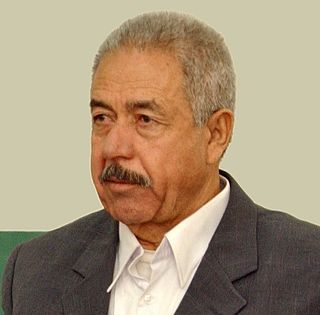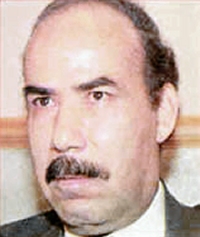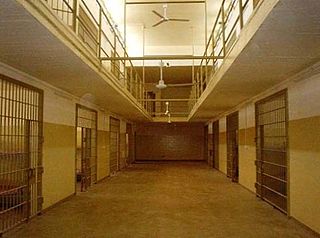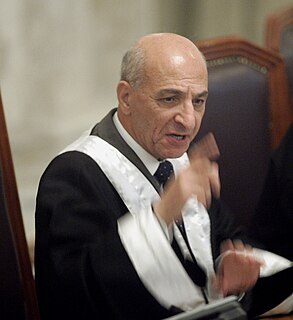Related Research Articles

Tariq Aziz was an Iraqi politician who served as Deputy Prime Minister, Minister of Foreign Affairs and a close advisor of President Saddam Hussein. Their association began in the 1950s when both were activists for the then-banned Arab Socialist Ba'ath Party. He was both an Arab nationalist and a member of the Chaldean Catholic Church.

Taha Yasin Ramadan al-Jizrawi (Arabic: طه ياسين رمضان الجزراوي; was an Iraqi politician and military officer of Kurdish origin, who served as one of the three vice presidents of Iraq from March 1991 to the fall of Saddam Hussein in April 2003.

Ali Hassan Abd al-Majid al-Tikriti, nicknamed Chemical Ali, was an Iraqi politician and military commander under Saddam Hussein who served as defence minister, interior minister, and chief of the Iraqi Intelligence Service. He was also the governor of Kuwait during much of the 1990–91 Gulf War.

William Ramsey Clark was an American lawyer, activist, and federal government official. A progressive, New Frontier liberal, he occupied senior positions in the United States Department of Justice under Presidents John F. Kennedy and Lyndon B. Johnson, serving as United States Attorney General from 1967 to 1969; previously, he was Deputy Attorney General from 1965 to 1967 and Assistant Attorney General from 1961 to 1965.

Barzan Ibrahim Hassan al-Tikriti, also known as Barazan Ibrahim al-Tikriti, Barasan Ibrahem Alhassen and Barzan Hassan, was one of three half-brothers of Saddam Hussein, and a leader of the Mukhabarat, the Iraqi intelligence service. Despite falling out of favour with Saddam at one time, he was believed to have been a close presidential adviser at the time of his capture by U.S. forces. On 15 January 2007, Barzan was hanged for crimes against humanity. He was decapitated by the hangman's rope after errors were made calculating his body weight and length of drop from the platform.

Abu Ghraib prison was a prison complex in Abu Ghraib, Iraq, located 32 kilometers (20 mi) west of Baghdad. Abu Ghraib prison was opened in the 1950s and served as a maximum-security prison with torture, weekly executions, and squalid living conditions. From the 1970s, the prison was used by Saddam Hussein and later the United States to hold political prisoners. It developed a reputation for torture and extrajudicial killing, and was closed in 2014.
The Iraqi High Tribunal (IHT), formerly the Iraqi Special Tribunal and sometimes referred to as the Supreme Iraqi Criminal Tribunal, is a body established under Iraqi national law to try Iraqi nationals or residents accused of genocide, crimes against humanity, war crimes or other serious crimes committed between 1968 and 2003. It organized the trial of Saddam Hussein and other members of his Ba'ath Party regime.

The Anfal campaign, also known as the Anfal genocide or the Kurdish genocide, was a genocidal counterinsurgency operation which was carried out by Ba'athist Iraq and killed between 50,000 and 182,000 Kurds in the late 1980s. The Iraqi forces were led by Ali Hassan al-Majid, on the orders of President Saddam Hussein, against Iraqi Kurdistan in northern Iraq during the final stages of the Iran–Iraq War. The campaign's purpose was to eliminate Kurdish rebel groups as well as to Arabize strategic parts of the Kirkuk Governorate.

Lieutenant General Abid Al-Hamid Mahmud al-Tikriti was an Iraqi military officer and Saddam Hussein's personal secretary.
Salem Chalabi is an Iraq-born, British- and American-educated lawyer. He was appointed as the first General Director of the Iraqi Special Tribunal, set up in 2003 to try Saddam Hussein and other members of his regime for crimes against humanity. His appointment, by an order signed by Paul Bremer, the head of the occupation authority, was widely criticized for perceived nepotism and he himself lacked any significant trial experience. He was ultimately dropped from the Tribunal after an arrest warrant was issued for investigation into his role in the murder of a director-general of the Iraqi Ministry of Finance who was investigating Chalabi family properties acquired in Iraq; the charge was ultimately dismissed citing lack of evidence.

The trial of Saddam Hussein was the trial of the deposed President of Iraq Saddam Hussein by the Iraqi Interim Government for crimes against humanity during his time in office.

Awad Hamad al-Bandar was an Iraqi chief judge under Saddam Hussein's presidency. He was a member of the Arab Socialist Ba'ath Party and was the head of the Revolutionary Court which issued death sentences against 143 Dujail residents, in the aftermath of the failed assassination attempt on the president on 8 July 1982.
Rizgar Mohammed Amin is the former chief judge of the Iraqi Special Tribunal's Al-Dujail trial. He is the only judge whose name was revealed on the trial's opening on 19 October 2005, the names of the other four judges and all but two of his four colleagues faces not allowed to be shown during the televised portions of the trial.(Telegraph.co.uk - 12:30AM GMT 15 January 2006)

Rauf Rashid Abd al-Rahman is the replacement chief judge of the Supreme Iraqi Criminal Tribunal's Al-Dujail trial of Saddam Hussein in 2006, when he sentenced Saddam and some of his top aides to death by hanging.
Capital punishment in Iraq is a legal penalty. It was commonly used by the government of Saddam Hussein, was temporarily halted after the US-led 2003 invasion of Iraq that deposed Saddam, and has since been reinstated. Executions are carried out by hanging.

The execution of former Iraqi President Saddam Hussein took place on 30 December 2006. Saddam Hussein was sentenced to death by hanging, after being convicted of crimes against humanity by the Iraqi Special Tribunal for the Dujail massacre—the killing of 148 Iraqi Shi'ites in the town of Dujail—in 1982, in retaliation for an assassination attempt against him.

Michael P. Scharf is co-dean, Joseph C. Hostetler – BakerHostetler professor of law, and the director of the Frederick K. Cox International Law Center at Case Western Reserve University School of Law. Scharf is also co-founder of the Public International Law & Policy Group (PILPG), a non-governmental organization (NGO) which provides pro bono legal assistance to developing states and states in transition. Since 1995 PILPG has provided pro bono legal assistance to states and governments involved in peace negotiations, drafting post-conflict constitutions, and prosecuting war criminals. Since March 2012, Scharf has also been the producer and host of Talking Foreign Policy, a one-hour radio program aired on a quarterly basis on Cleveland’s NPR affiliate WCPN 90.3 ideastream.
Anne L. Mactavish is a Canadian jurist who is a judge of the Federal Court of Appeal.
The judiciary of Iraq is a branch of the government of Iraq that interprets and applies the laws of Iraq, to ensure equal justice under law, and provides a mechanism for dispute resolution. The judiciary is composed of the Higher Judicial Council, the Supreme Court, the Court of Cassation, the Public Prosecution Department, the Judiciary Oversight Commission, the Supreme Iraqi Criminal Tribunal, the Central Criminal Court and other courts that are regulated by law.
Mohammed Oreibi Al-Khalifa was chief judge of the Iraqi Special Tribunal's Al-Anfal trial.
References
- ↑ "Iraq war crimes tribunal flawed: rights group". ABC News (Australia) . 17 December 2004. Archived from the original on 28 June 2011. Retrieved 18 February 2011.
- ↑ "New head appointed to Saddam trial court; judges to get protection". Voice of the Mujahidin. 4 October 2004. Retrieved 18 February 2011.
- ↑ "Saddam on trial 'in two months'". The Guardian . 1 June 2005. Retrieved 18 February 2011.